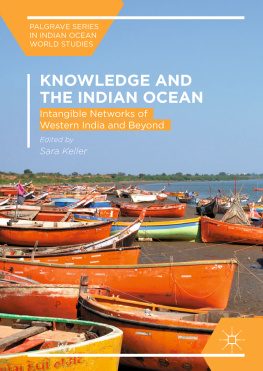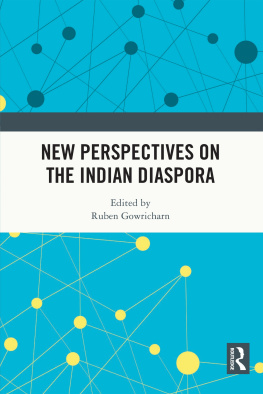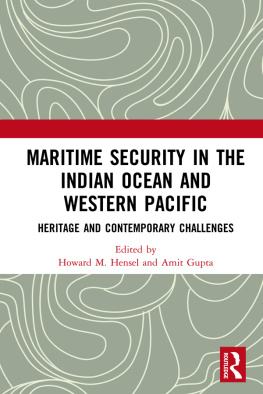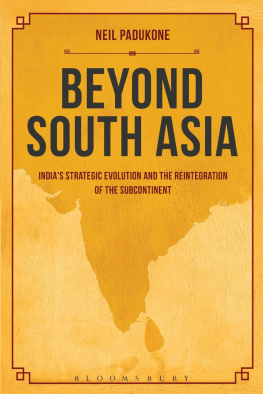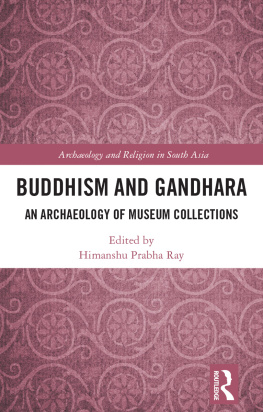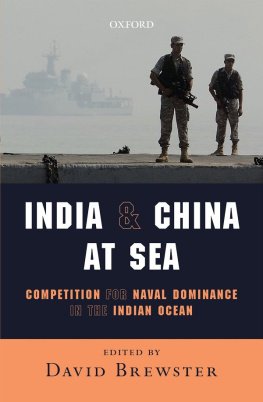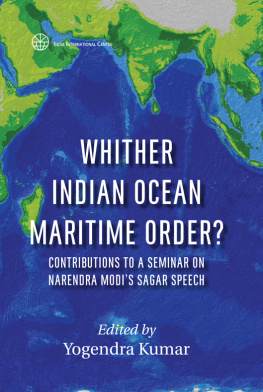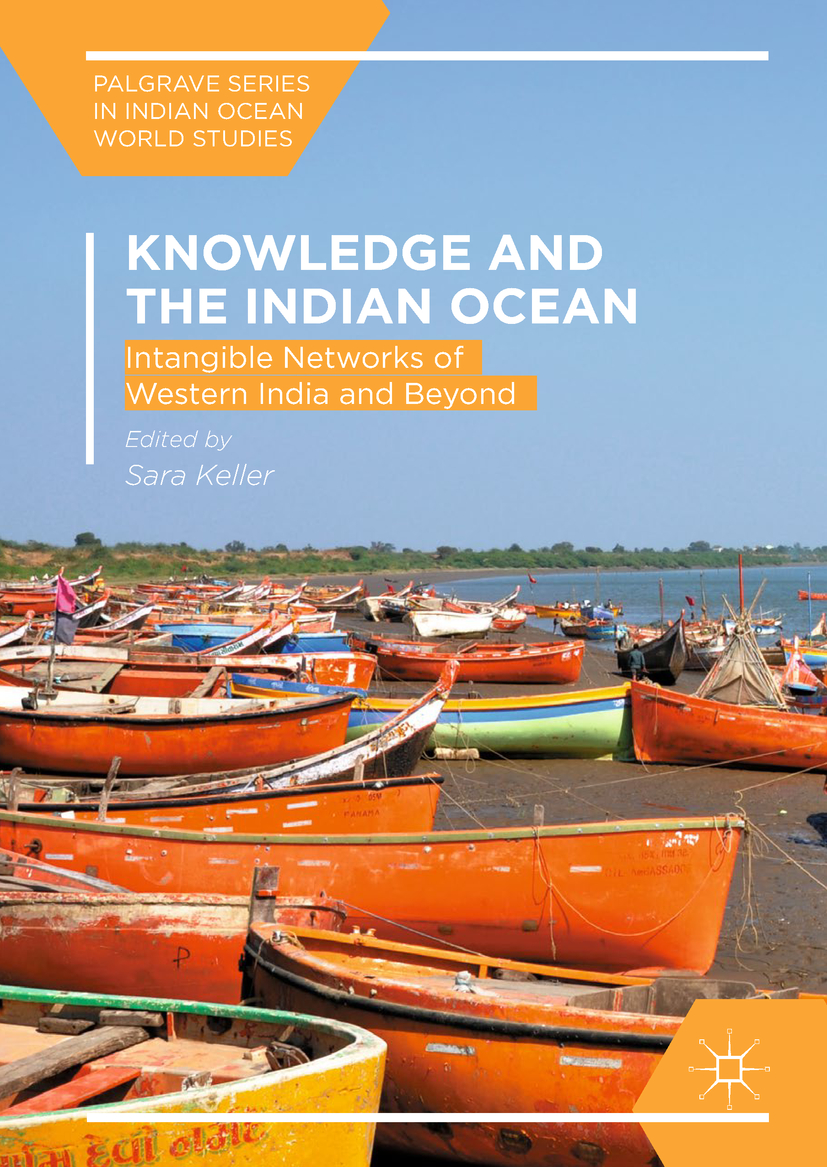Palgrave Series in Indian Ocean World Studies
Series Editor
Gwyn Campbell
McGill University, Montreal, Canada
This is the first scholarly series devoted to the study of the Indian Ocean world from early times to the present day. Encouraging interdisciplinarity, it incorporates and contributes to key debates in a number of areas including history, environmental studies, anthropology, sociology, political science, geography, economics, law, and labor and gender studies. Because it breaks from the restrictions imposed by country/regional studies and Eurocentric periodization, the series provides new frameworks through which to interpret past events, and new insights for present-day policymakers in key areas from labor relations and migration to diplomacy and trade.
More information about this series at http://www.palgrave.com/gp/series/14661
Knowledge and the Indian Ocean Intangible Networks of Western India and Beyond
Editor
Sara Keller
Orient et Mditerrane, Paris, France
Palgrave Series in Indian Ocean World Studies
ISBN 978-3-319-96838-4 e-ISBN 978-3-319-96839-1
https://doi.org/10.1007/978-3-319-96839-1
Library of Congress Control Number: 2018949832
The Editor(s) (if applicable) and The Author(s) 2019
This work is subject to copyright. All rights are solely and exclusively licensed by the Publisher, whether the whole or part of the material is concerned, specifically the rights of translation, reprinting, reuse of illustrations, recitation, broadcasting, reproduction on microfilms or in any other physical way, and transmission or information storage and retrieval, electronic adaptation, computer software, or by similar or dissimilar methodology now known or hereafter developed.
The use of general descriptive names, registered names, trademarks, service marks, etc. in this publication does not imply, even in the absence of a specific statement, that such names are exempt from the relevant protective laws and regulations and therefore free for general use.
The publisher, the authors and the editors are safe to assume that the advice and information in this book are believed to be true and accurate at the date of publication. Neither the publisher nor the authors or the editors give a warranty, express or implied, with respect to the material contained herein or for any errors or omissions that may have been made. The publisher remains neutral with regard to jurisdictional claims in published maps and institutional affiliations.
Cover image: Courtesy of Sara Keller
This Palgrave Macmillan imprint is published by the registered company Springer Nature Switzerland AG
The registered company address is: Gewerbestrasse 11, 6330 Cham, Switzerland
Foreword by Hasmukh Shah
Like any Indian entity we too were familiar with mythological stories relating to the seas. The one of the churning of the ocean to settle the rivalry between gods and the powerful elements of the netherworld, Samudramanthan , particularly, has been so effectively depicted in an incredibly large bas relief away from India in a forlorn temple area in Sim Riep, Cambodia. But such exposures did not make us wiser about the oceans breadth, depth, turbulence, deceiving tranquillity or its imagery, metaphor and the underlying MEANING of those stories. Our belief that a series of symposia on the ocean will sensitise people on many and varied aspects of the ocean was, however, vindicated.
What we, in Darshak Itihas Nidhi (DIN), learnt was the shallow waters we were wading in; that DIN had a long way to go. On the positive side, however, we had much to show. DIN received encouragement and, indeed, active support of people like Michael Pearson, Lotika Varadarajan, Honor Frost, Sugata Bose, Keki Daruwala and Gulam Mohamed Sheikh. We did not have to struggle much to raise resources to hold 50125 people in places small and bereft of infrastructure for visitors or an international event at Mandvi and Daman. We received popular support; the society stood by us enabling us to set up an independent Fund, the Maritime History Fund. Our post-symposia volumes provided much needed authenticity to deliberations. Readers found serious scholarship in DINs publications. More important, our experiment to interact with eminent people from other disciplines in deliberations met with immense success. Thus, we had economists and philologists, art historians and poets, writers and civil servants as speakers lecturing to and rubbing shoulders with historians. One also saw entrepreneurs and technocrats, college students and graphic designers, descendants of old families preferring to sit unobtrusively interacting with historians in non-formal slots. And, in Bharuch, we had the participation of Indian Navy when Admiral Sunil Lamba, Chief of the Naval Staff of the Indian Navy, spoke as a soldier-scholar making it possible to have deliberations on the surface of the Indian Ocean surrounded by water mass of the Ocean on all sides. That made waves.
Armed with our experience of holding four international symposia we feel we have confidence to revisit the main objectives of DIN, namely stimulating awareness towards history and heritage, supporting historical research and offering a multidisciplinary platform capable of raising issues regarding identity and heritage while continuing our Samudramanthan . Darshak Itihas Nidhi is a Foundation for Studies and Research in History created 2007 in Gujarat in the footsteps of Darshak. Manubhai Pancholi (19142001), better known with his nom de plume Darshak, was an eminent intellectual, educationist, social philosopher and commentator and a profound student of world history. The foundation took up the task of publishing books on history in Gujarati and English, it organizes international conferences since 2010.
While DIN will revisit its mandate and re-form its strategy and priorities, one area DIN is better placed than several others is the area of synergy and networking. DIN feels that interdisciplinary studies have not received adequate attention of scholars who work on borders of disciplines. There are yawning knowledge gaps on borders of history on the one hand and anthropology, sociology, genetics, metallurgy, physics, physical geography and a host of disciplines on the other. Climate change for instance has had significant impact on various life forms in the past. It will have much greater impact in the future, more due to and on oceans and equally high on immediate on shore. DIN is currently associating these impacts with an on shore study which might have an impact on the course of history. Similar studies would help historians anticipate and interpret events more precisely. DIN is also engaged in exploring the possibility of such joint study and research with local universities.
Now, a word from a non-historian. Can we not be somewhat more precise in time management? For, at every stage of planning an event till the publication of the post-symposium volume, there are avoidable delays much to the frustration of sponsors and hosts. It is urgent, to follow the lightening move of our society, and the rash development of projects and studies, to improve the efficiency of our efforts.
Hasmukh Shah Chairman, Darshak Itihas Nidhi

